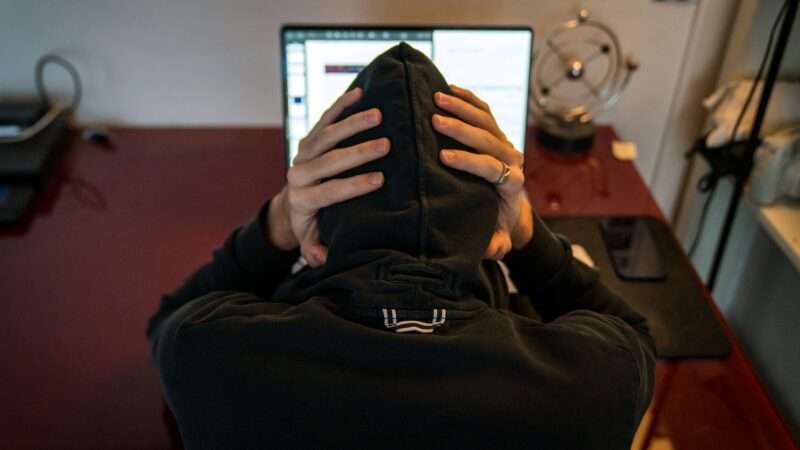
When Hong Kong’s national security law went into effect in June 2020, critics warned that forcing the long-independent special administrative region into China’s fold would winnow away at both legal free speech rights and hallowed cultural norms. Critics have been sadly vindicated: Police forces have raided the newsrooms of publications that are critical of China and arrested journalists; students and faculty report professors who criticize Beijing to tip lines; and plenty of people have fled their homes, seeking refuge overseas via the U.K.’s generous special visa policy. But the COVID-19 pandemic has forced these issues to transcend borders in unexpected ways, threatening academic freedom for those who chose to study in the U.S., too.
Early in 2020, for example, many American professors had to deal with a novel conundrum: Students from Hong Kong were sent back home, but still Zooming into their university classes in America. “I don’t think people understand how… a speech rule in China suddenly becomes a speech issue in the United States. It’s kind of jarring,” Foundation for Individual Rights in Education’s (FIRE) Sarah McLaughlin’s tells Reason.
China has long been the number one feeder of international students to the U.S.; for the 2020–21 school year, more than 317,000 Chinese students were enrolled at American higher ed institutions. Hong Kong sends about 6,800 students overseas to American universities each year. Thus, McLaughlin says, the question arose at the start of the pandemic when foreign nationals were temporarily expelled from the U.S.: “Is it safe for them to learn?”
American professors started “try[ing] to find the safest way to teach without censoring themselves,” McLaughlin says. They have taken certain discussion off of certain platforms; started using blind grading and allowing students to not submit papers under their own names; changed some conversations to be one-on-one instead of group discussions where another student could possibly record or disseminate the comments of a student living under Beijing’s thumb. Some professors, like Rory Truex at Princeton, issued warnings in their syllabuses, saying in essence that if a student was currently residing in China, they should wait to take a given class until they’re back on American soil.
Academics elsewhere have stooped to disturbing self-censorship to stave off Chinese Communist Party (CCP) censors. A teaching assistant at the University of Toronto declared he’d been told not to talk about certain issues online because it could put some students at risk; a guest lecturer-journalist from the Hong Kong Free Press declined an already-agreed-to speaking opportunity at the University of Leeds because he had been instructed by hosts to avoid focusing on the Hong Kong protests out of concern for the safety of Chinese students attending the lecture remotely.
In some ways, videoconferencing technology like Zoom enabled learning to continue unabated when international students were sent home from America. But for students in Hong Kong, the national security law—which seeks to bring Hong Kong under tighter CCP control, imperiling speech rights—collided with pandemic-era tech solutions to create a tricky situation; professors have called on Zoom to provide certain contractual promises related to sharing private information with the Chinese government and complying with the CCP’s censorship demands. But the company has been either quiescent on that front or actively bad: a China-based ex-Zoom employee has been charged by federal prosecutors with secretly censoring Tiananmen Square vigils held via the platform in 2020. The Verge reports that “[Xinjiang] Jin allegedly identified users who discussed ‘disfavorable’ political and religious topics, then worked with other employees to stop these users from participating in calls,” asking “US-based employees to provide account information about dissidents planning to commemorate the events,” and getting the company to block the accounts of several users who were hosting Tiananmen events from Hong Kong in New York, due to the fact that some attendees were based in China.
Ultimately, “Chinese authorities…detained potential participants inside China and in at least one case, it threatened the family of a participant living abroad.” Though Zoom apologized, disquieting situations like these leave international students and their U.S.-based professors wondering about the technology’s security and how to retain anonymity while attempting to study from their home countries.
Some schools like Dartmouth have pursued technical fixes, “including removing identifying information and metadata from submitted assignments, disabling video on Zoom and turning off recording and transcription,” as well as allowing “students [to] be excused from participation grades in assignments where anonymity is ‘not possible.'” And, for now, some number of students—the U.S. embassy in Beijing estimated a little under one-third as of the start of the 2021 school year—have been allowed to return to on-campus instruction in the U.S., to the extent that it exists, allowing them to take part in more robust discourse far from the prying eyes of the state.
Professors in Hong Kong, and international students from Hong Kong who study in the U.S. (not to mention their mainland Chinese counterparts), already had to worry about what might happen if a student takes a phone out and films comments made during classes. With the widespread adoption of remote learning, that’s gotten exponentially worse, says McLaughlin. “Whether it’s the intent or not, the effect of forcing everything online makes it a lot easier to hunt down, censor, and punish speech that’s critical of the government.”
The post When the CCP Threatens International Students' Academic Freedom appeared first on Reason.com.
from Latest – Reason.com https://ift.tt/3AtTlFe
via IFTTT